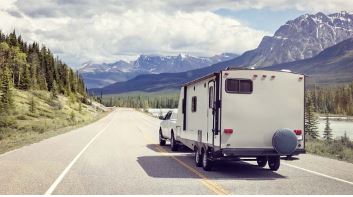No one likes that unstable feeling when the trailer or RV you’re towing begins whipping around. The most common causes for trailer sway are improper weight distribution, tight turns, steep roads, high-speed driving, a tall truck passing, crosswinds, over-steering, and under-inflated tires.

1. Know how much trailer sway is normal
When you’re towing a trailer or RV, you can expect a little movement, especially when you go over bumps in the road. However, swaying – or persistent side-to-side motion – isn’t .
Trust your gut. If you begin to feel that uneasy back-and-forth rocking movement, something’s wrong. Try to stay calm. Stop accelerating, but don’t hit the brakes because that could increase the sway, and you’d risk overturning.
2. Get the right hitch
The hitch, a crucial device that attaches your trailer to the vehicle that’s towing it, needs to be the correct one for your load. The National Association of Trailer Manufacturers (NATM) recommends having the proper hitching mechanisms to prevent sway.
A load-distributing hitch, also called a weight-distributing hitch or load equalizer, helps stabilize your tow vehicle. Pay attention to the hitch manufacturer’s recommendations. Higher trailer weights need a van or pickup truck at the front, not a passenger car.
3. Load the trailer correctly
Learning how to load a trailer to prevent swaying isn’t complicated, but it does take some pre-planning. Placing too much weight at the back of your trailer or RV sets you up for a rough ride. Instead, try to load just over half the weight (around 60%) toward the front.
Distribute your cargo evenly within the front and the back trailer halves, so one side isn’t heavier than the other, throwing it off balance. Secure everything with the correct straps for the cargo, or it’ll fly around once you get going, creating an uneven load.
Don’t overload your trailer either. The tow vehicle weight plus your fully loaded trailer weight shouldn’t exceed what’s called the gross combination weight rating set by the tow vehicle manufacturer. You can find that rating in the owner’s manual.
4. Install a sway control device
A sway control device makes a separate vehicle and trailer feel like one by stiffening the connection between the two. You’ll spot several different types on the market. Some devices get built into a weight distribution system. The one that would work for you depends partly on your trailer weight.
Electronic tow control systems connect to your brakes, detect trailer sway, and automatically make adjustments that control the movement. This device also takes your brakes’ condition and efficiency into account. These advanced systems may cost hundreds of dollars on average.
5. Driver slow
One of the most crucial RV towing tips is to take it slow. Stay under 55 miles per hour. Not only is that the towing speed limit in many states, but you’ll be safer, save on fuel, and reduce the strain on your vehicle and the trailer. When winds pick up, go even slower or pull over to wait for calmer conditions. Aim for gentle, gradual maneuvers as you’re stopping, starting, and turning. Sudden jerky movements can lead to precarious swaying.
6. Check your tires
Underinflated tires on your tow vehicle or trailer lower the load capacity, which contributes to sway. Low tire pressure or worn tires can cause a blowout. Similarly, overinflation can also hamper handling. Learn how to check tire pressure.
What to do when your trailer starts swaying
Even if you’re doing everything right, a sudden wind gust or crosswind can throw everything off. When that happens, follow these driving tips from NATM and the National Highway Traffic Safety Administration (NHTSA):
- Take your foot off the gas to slow down
- Don’t brake
- Keep a firm hold on the steering wheel
- Avoid turning the wheel
- Wait for the sway to subside
Trailer sway quickly becomes dangerous, but thoughtful preparation and careful driving can prevent it from happening so you can enjoy a smooth, steady ride with everything safely in tow. Learn more about how to keep your RV protected with RV insurance from Progressive.

